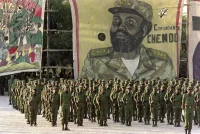
Polarized reconciliation in Angola
In August, Angola's government-led Reconciliation commission (CIVICOP) stirred up controversy by taking yet another contentious step. A CIVICOP delegation, closely accompanied by a group of journalists from state television broadcaster TPA, set out on a journey to search for victims in an area that was, during Angola's civil war (1975-2002), controlled by current opposition party UNITA. The delegation, headed by the director of Angola's intelligence service, was on a specific mission: locating the remains of disfavored UNITA members who were allegedly killed during the civil war on the orders of Jonas Savimbi, UNITA's founder and former leader. The commission's initiative triggered significant outrage within UNITA and exposed a reconciliation process that has become increasingly politicized and polarized.… Seguir leyendo »

